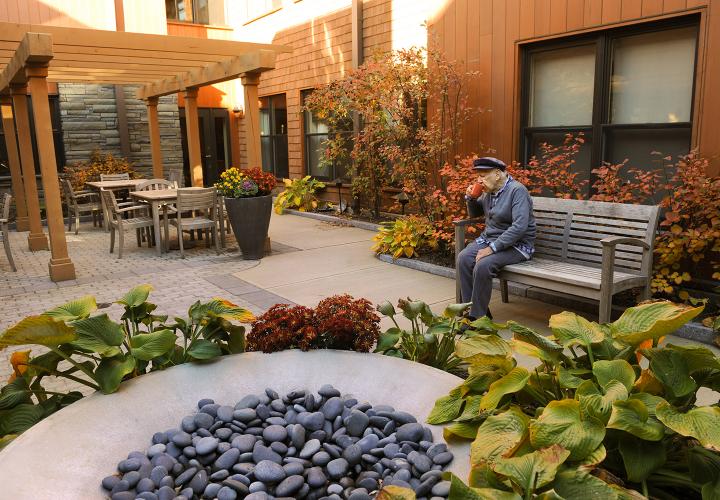Adeptly Managed Programs for Quality Alzheimers Care Charlotte Solutions
Adeptly Managed Programs for Quality Alzheimers Care Charlotte Solutions
Blog Article
Developing a Safe and Encouraging Environment for Alzheimer's Treatment
The production of a secure and helpful environment for people with Alzheimer's is paramount in enhancing their lifestyle. This includes not just physical adjustments within the home, such as minimizing threats and integrating familiar elements, however likewise the application of structured routines and significant tasks that deal with their cognitive needs. Additionally, comprehending the psychological and psychological dimensions of care can substantially affect their feeling of security and connection. Checking out these diverse techniques can disclose crucial insights into reliable caregiving methods that may transform the daily experiences of both clients and caregivers.
Understanding Alzheimer's Requirements
Frequently, people with Alzheimer's condition show an array of demands that call for tailored methods to care. As the condition progresses, cognitive decline shows up in different methods, affecting memory, reasoning, and even the capacity to perform everyday activities. Caregivers need to identify these progressing needs to give suitable assistance and guarantee a better of life for those affected.
One vital element of comprehending Alzheimer's requirements is acknowledging the value of regular and familiarity. Individuals usually discover convenience in well established patterns, which can reduce anxiety and confusion. Caregivers must make every effort to create structured everyday schedules that incorporate meaningful tasks lined up with the person's capacities and interests.
Furthermore, efficient interaction is critical. People with Alzheimer's might struggle to reveal themselves or comprehend complicated language. Caregivers must use simple, clear language, use non-verbal signs, and practice active listening to foster understanding and connection.
Finally, emotional and social requirements can not be forgotten. Giving possibilities for social communication and preserving relationships can considerably boost emotional health. Caretakers should urge involvement in community activities or household events, promoting a sense of belonging and objective. Recognizing these varied requirements is important for creating a helpful care setting.
Designing a Safe Home
Creating a safe home for individuals with Alzheimer's condition is important to decreasing dangers and promoting self-reliance. The layout of the home need to focus on safety while permitting personal comfort. Get rid of potential threats such as loosened rugs, sharp objects, and mess, which can lead to drops or mishaps. Make sure that pathways are clear and well-lit, as correct lighting reduces disorientation and boosts wheelchair.
Integrating adaptive attributes is also crucial. Set up grab bars in washrooms and near staircases, and take into consideration utilizing non-slip mats in damp locations. Furthermore, using contrasting shades for floorings and walls can aid in distinguishing spaces, helping to minimize complication.
Experience is very important for people with Alzheimer's. Individualizing the atmosphere with familiar things and photographs can strengthen a sense of belonging and safety and security - Alzheimers Care Charlotte. It is additionally useful to have actually a designated location for everyday tasks, such as reading or crafting, which can offer framework to their day
Lastly, implementing a safe and secure outside room enables for safe expedition while getting in touch with nature. By thoughtfully developing the home setting, caretakers can considerably enhance the lifestyle for individuals coping with Alzheimer's condition.
Enhancing Communication Skills

Non-verbal interaction, consisting of faces, motions, and touch, plays a vital function in communicating empathy and understanding. Keeping eye contact and a calm behavior can enhance the convenience degree of the individual, promoting a sense of safety.
Moreover, it is essential to exercise active listening. This involves being totally existing, showing persistence, and allowing the individual to reveal themselves without interruption. Repeating might be necessary; caretakers ought to be prepared to revisit inquiries or topics, as individuals with Alzheimer's might fight with memory recall.
In addition, utilizing visual aids or signs, such as photographs or acquainted items, can facilitate acknowledgment and involvement. Eventually, enhancing interaction skills is regarding building depend on and developing an atmosphere where people feel listened to, valued, and understood, consequently enriching their top quality of life.
Motivating Social Communication
Fostering purposeful social interactions can substantially improve the wellness of people with Alzheimer's condition. Engaging with others not just assists combat sensations of isolation yet also promotes cognitive feature and psychological health. Structured social tasks, such as team arts, video games and crafts, or music treatment, develop opportunities for citizens to attach with peers and caregivers, which can bring about boosted state of mind and reduced stress and anxiety.
Developing an inviting environment that motivates socializing is important. This can article be accomplished by preparing public areas that facilitate interaction, such as comfortable seating areas or activity spaces. In addition, integrating culturally relevant and acquainted tasks can urge and trigger memories engagement, allowing people with Alzheimer's to really feel even more linked to their previous experiences.
In addition, caregivers should be trained to recognize and promote social involvement among residents. Simple gestures, such as initiating discussion or facilitating tiny seminar, can aid people really feel valued and consisted next page of. On a regular basis arranged get-togethers ought to correspond yet flexible, suiting differing degrees of capacity and rate of interest. By prioritizing social interaction, we can significantly improve the lives of those coping with Alzheimer's, cultivating a sense of area and belonging.
Supporting Caregiver Health

To sustain caretakers, companies should use normal training and educational resources to boost their understanding of Alzheimer's condition and caregiving strategies. Offering access to reprieve treatment solutions allows caregivers to take needed breaks, reducing anxiety and exhaustion - Alzheimers Care Charlotte. In addition, fostering a community with support system can assist in psychological sharing and the exchange of sensible advice among caregivers, producing a network of mutual assistance
Mental health resources, such as counseling services, can also be essential in dealing with the his comment is here psychological toll caregiving can take. By focusing on caretaker health, we develop an even more lasting caregiving setting that not only profits the caretakers themselves but also enhances the overall quality of care received by people with Alzheimer's. Eventually, sustaining caretakers is a crucial component in fostering a compassionate and effective care setting.
Conclusion
To conclude, the creation of a encouraging and secure environment for individuals with Alzheimer's is important to boosting their lifestyle. By prioritizing safety with thoughtful style, cultivating psychological wellness with familiar components, and promoting involvement via structured routines, caregivers can dramatically affect the overall experience of those affected by this problem. Supporting caretaker wellness is essential, as it inevitably contributes to an extra efficient and compassionate treatment environment.
Repeating may be needed; caregivers must be prepared to review topics or inquiries, as people with Alzheimer's may battle with memory recall.

Report this page